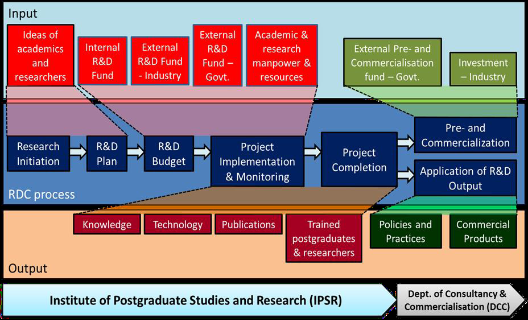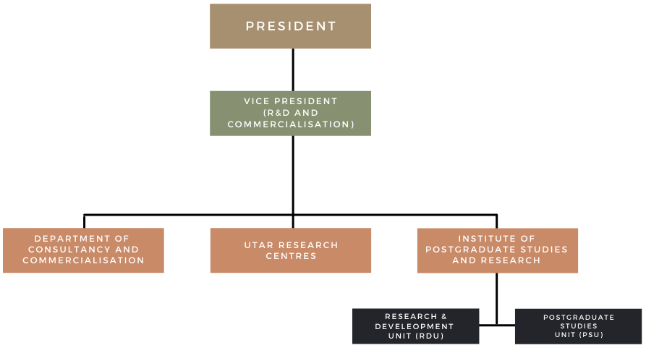
In the year 2022, Universiti Tunku Abdul Rahman (UTAR) celebrates its 20th anniversary and continues to make progress and gain recognition as one of the leading research universities in Malaysia. This is the twelth annual report on Research & Development of the university. The Faculties, Research Centres and supporting units made significant progress in the year 2022 as can be seen in their respective reports.
In today‘s highly competitive and globalised environment, it is imperative that organisations such as universities continuously enhance their roles in knowledge and value creation to ensure their relevance to the economy and society. Research, development and commercialisation (RDC) thus become the key activities of universities. UTAR, being one of the many institutions of higher learning in the country, continues to focus and excel in RDC to ensure its long-term survival, relevance and recognition. UTAR has defined and continues to refine its direction and approach in transforming itself into a world recognised research-focused university.

- Cross-disciplinary research to solve real world problems
- Diversification of research funding sources
- Publication and Patent filing
- Commercialisation and Consultancy
- International collaborations
The UTAR 10-Year Strategic Plan 2023-2032 was launched on 16 December 2022 to essentially provide a framework for all staff to make daily operational decisions and it is envisaged that these decisions and their related processes will move the university in the same direction. The strategic plan provides a vision of the future, confirms the purpose and enhances the values of the university.

- The UTAR Postdoctoral Research Scheme was revised to UTAR Postdoctoral Research Scholar/ visiting scholar/ sabbatical placement etc in April 2022 to create a new category for the scholar;
- Revisions to Research Scholarship Scheme (RSS) Guideline in June 2022 allow the RSS to be designated as a Graduate Research Assistantship and provide a more consistent timeline for RSS to complete the Proposal Defence and mobilise the RSS to assist the University in administrative tasks;
- Revisions to UTAR Research Publication Scheme (UTAR RPS) Guideline in June to encourage the researchers to utilise their awarded UTAR RPS;
- Revisions to the Financial Support for Journal Paper Publication for Staff Policy (FSJPP) in June 2022 to incorporate compliance with other UTAR policy and procedures;
- Revisions as follows to the Guideline on the Organisation of Student Conference, Seminar, Forum, Participation of Student in Contest, Design Competition and Other Events Related to R&D in December 2022 due to the provision of funding for student’s competition will be under IPSR budget instead of UTAR R&D budget with effect from 2023:
- The current guideline was renamed to “Guideline on the Organising of Student Conference, Seminar, Forum and Other Events related to R&D;
- New guideline Guidelines on the Participation of Student in Contest and Design Competition related to R&D was approved.


- Institute of Postgraduate Studies and Research (IPSR);
- Department of Consultancy and Commercialisation (DCC).
- Research and Development Unit (RDU);
- Postgraduate Studies Unit (PSU).

- Good quality research ideas can only come from an academic and research community that is highly motivated and has strong healthy research culture and diversity of disciplines and specialisations. Thus far, much effort has been spent for such purposes.
- For the year 2022, thirty five (35) research centres in UTAR continued to implement and carry out their respective activities as well co-operate in comprehensive research projects to improve better utilisation of facilities and resources.
- Frequent discussions, dialogues and workshops among researchers of different research centres, backgrounds and disciplines are held to stimulate more research ideas across discipline/s and relevant to the socio-economic problems faced in the country.

- Guidance and support are constantly provided by IPSR to assist academic staff and researchers of UTAR to transform ideas into feasible research project plans.
- To assist new staff on UTARRF application, IPSR organised a workshop entitled “The Guide on Research Proposal Writing” and Briefing on UTARRF 2022 Cycle 2 Application. The workshop and briefing were held on 26 July 2022 via Microsoft Teams online meeting.
- A series of workshops (conducted by MOHE Panel) to facilitate UTAR applicants and evaluators in applying and evaluating FRGS grant was held from 1 December 2021 to 15 January 2022.

- IPSR continues to look out for additional potential external sources of funding for research activities in UTAR. Such information is constantly disseminated to the university community; support and advice are provided so that a good match between the interests of the researchers and the funding agencies can be attained and thus enhancing the success rates of fund biddings.
- The UTAR R&D Fund was established in 2005 with an initial amount of RM1 million allocated per annum. The allocation is intended to serve as seed fund to kick-start implementation of projects with good potential. This amount was subsequently increased to RM3 million in year 2010. The University management further increased the annual allocation for UTAR R&D Fund to RM5 million for each year of 2011 till 2014, RM6.25 million for 2015 and subsequently to RM6.42 million and RM6.525 for 2021 and 2022 respectively. It enables additional and larger scale projects to be initiated as well as boost research & development activities geared towards realising the goal for UTAR to invigorate intellectual pursuits through research and innovation that have impact on society.

- IPSR provides the support and services required throughout the research project implementation such as project financial account setup and maintenance, procurement, manpower sourcing, progress monitoring and report, output measurement, etc.
- Close monitoring of project progress and outcome measurement have been one of the main focuses of IPSR. For this, IPSR facilitates to ensure that projects have been carefully planned such that deliverables and outcome are measurable and clearly mapped to major research key performance indicators (KPIs) of individuals, departments, faculties and university.

- Support, guidance and advice on commercialisation process have been further strengthened to minimise problems and hindrances faced by researchers to commercialise their research output/s;
- Seminars and workshops on various aspects of commercialisation have been conducted for awareness enhancement and information dissemination;
- Constant dialogues, discussions and match-making with external parties such as venture capitalists, commercialisation seed funding agencies, private corporate industries, etc. have been held.

